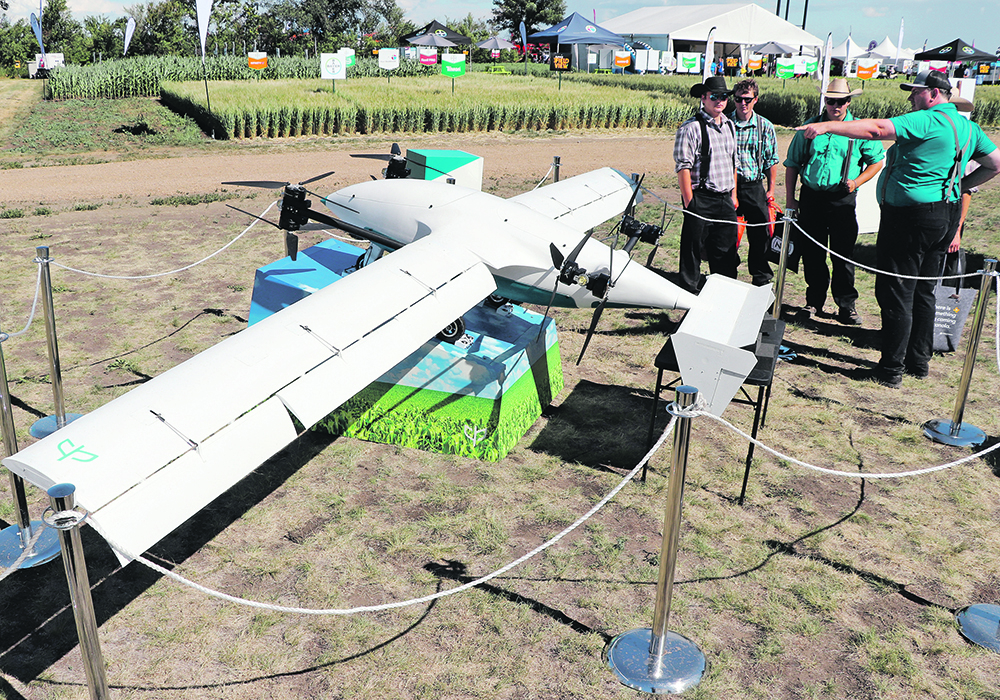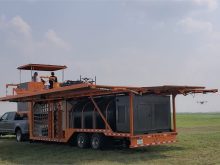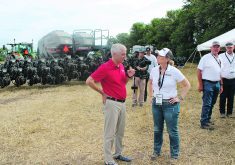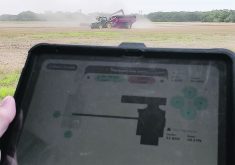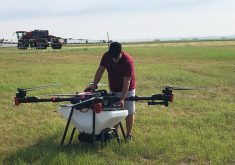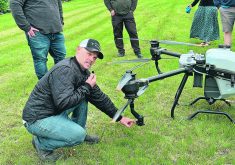Two Canadian companies are among the eight selected by John Deere for its 2023 Startup Collaborators program.
Deere started the program in 2019 to help it find innovative agricultural and construction technologies.
“We don’t have the market cornered on all the good ideas and we’re always innovating and always listening to what our customers’ needs and pain points are, and just trying to find solutions that can help improve our farmers’ bottom lines,” said Michele Kaiser, business development manager at Deere.
The two Canadian companies selected for Deere’s 2023 Startup Collaborator program are Precision AI and IntelliCulture.
Read Also

Taking a look inside Canada’s seed regulatory overhaul
ive years, eight task teams, 130 volunteers and 135 recommendations later, Canada’s seed industry is still waiting for meaningful regulatory change.
Precision AI is based in Regina and is developing an autonomous, fixed-wing drone that uses artificial intelligence to identify and treat individual weeds within a broad acre crop canopy. IntelliCulture is based in London, Ont., and provides farm equipment management software.
Kaiser said each of the selected companies are provided a Deere mentor and project lead, and then they work together to decide on a project. The companies then work together for one year.
“We also pair them with a business mentor who’s an executive level leader of Deere so they can help them understand different questions about organizational management and structure and go-to-market plans and distribution plans,” Kaiser said.
She describes the relationship between Deere and the selected companies as a loose collaboration.
“We don’t trade any equity, we don’t have a seat on the board, nor do they have any kind of ownership in our company either. So, it’s really and truly just a collaborative arrangement. We’re not developing any IP together or anything like that,” Kaiser said.
Deere acquired Bear Flag Robotics and invested in Hello Tractor after those companies participated in the program. However, Kaiser said acquisition is not the goal.
“We’ve kept in touch with almost everyone we’ve worked with, so again investment and acquisition is not the goal, but it has happened twice,” Kaiser said. “The whole idea is to make big ideas bigger.”
Deere looks for companies that have a strategic fit in solving customer pain points. Generally they are found through conferences, industry contacts and messages to Deere’s public relations department.
Kaiser said Deere is interested in Precision AI’s drone concept. It has a 20-foot wingspan, weighs 55 kilograms empty, and has a 20-litre application tank. It was designed to treat individual weeds while travelling 80 km/h at a height of eight to 10 feet.
“Precision AI is a fixed-wing vertical takeoff and landing drone that essentially does sense and act with spraying,” Kaiser said.
“Their goal is to be able to do that at a high speed such that it’s scalable to a large broad acre crops. So, we’re excited about that, just to study that space and see what might be interesting.”
IntelliCulture has farm equipment management software to help drive sustainable farming practices.
“They bring farm and resource management through software solutions, that’s mixed fleet. So, farmers and growers, in the specialty crop regions especially, are able to track all of their vehicles’ preventative maintenance. They’re able to track all their operators, and the efficiency and productivity of the operators,” Kaiser said.
Another selected startup is Impossible Sensing, an aerospace company that’s developing and applying space technology to the agriculture industry.
“They are doing analysis of materials on Mars or under the ocean. And so, they haven’t dived into the ag space, but they’re interested in doing that,” Kaiser said.
“I think that one is very relevant for us as we think about some of our leap ambitions and how we can help provide farmers with better tools if we can apply that same technology to soil on the farm.”
ANELLO Photonics, also selected by Deere, uses an optical gyroscope for autonomous applications.
“They’re working in GNSS (Global Navigation Satellite Systems), so satellite-denied environments, and that’s interesting for us in our specialty crop areas where there are tree canopies, for example, that make communications difficult,” Kaiser said.
Albedo is a start-up developing low-flying satellites that will collect visible and thermal imagery at ultra-high resolution.
GrAI Matter Labs developed the Life-Ready AI chip that offers artificial intelligence with a low-power envelope. The brain-inspired computer chip understand signals produced by sensors.
RodRadar developed its Live Dig Radar technology that provides real-time, on-site and automatic alerts to prevent damage to underground utility infrastructure during excavation.
Vega certifies agribusiness sustainability through traceability, risk analysis and monitoring of environmental, social and governance practices.


